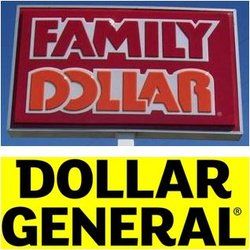Family Dollar rejected a bid worth $8.9 billion from its largest rival Dollar General , saying it prefers the Dollar Tree merger deal, even though it involves less money ($8.5 billion). Members of Family Dollar’s board of directors unanimously rejected the Dollar General offer, citing antitrust regulatory considerations.
Dollar General offered $78.50 per share, and said it would be willing to sell up to 700 stores to secure approval for a deal.
Family Dollar, however, does not believe such a move would be enough to satisfy antitrust regulators.
Put simply, it predicts that a deal with Dollar Tree, at $74.50 per share, is more likely to get through the antitrust hoops.
This is the latest chapter in the fierce competition for control of “dollar store” space. These types of shops sell low-priced products which the middle class, who are still smarting from the effects of the global financial crisis and the Great Recession that followed, flock to. They are gaining market share and seeking to expand even more.
Over the last few years, Family Dollar and Dollar General, which sell items priced at $10 or less, and Dollar Tree, whose products average about $1, have been attracting customers away from Wal-Mart and other retail giants. A merger between any of these three dollar store retailers would create another giant that could cause Wal-Mart some really serious problems.
Antitrust considerations
Chairman and CEO of Family Dollar, Howard R. Levine, said:
“Our Board of Directors, with the assistance of outside advisors and consultants, has been carefully analyzing the antitrust issues in a potential combination with Dollar General since the beginning of this year, as detailed in the Company’s preliminary proxy statement that was filed by Dollar Tree with the SEC on August 11.”
“Our Board reviewed, with our advisors, all aspects of Dollar General’s proposal and unanimously concluded that it is not reasonably likely to be completed on the terms proposed. Accordingly, our Board rejects Dollar General’s proposal and reaffirms its support for the pending merger with Dollar Tree.”
Mr. Levine added that Dollar General’s letter, which was sent late the previous night, contained blatant mischaracterizations.
In the US, ‘dollar stores’ are rapidly gaining market share.
Dollar General seems set on a deal
On Thursday, Dollar General said it was disappointed with Family Dollar’s negative response, and was reviewing its options. It emphasized its offer was better than Dollar Tree’s.
Rick Dreiling, Dollar General’s Chairman and Chief Executive Officer, said:
“We have done extensive antitrust analysis using experienced advisers, the results of which confirm that the transaction as proposed is capable of being completed. We remain willing to share this analysis with Family Dollar and its counsel and are confident that we will be able to quickly and efficiently resolve any potential antitrust issues.”
The New York Times quoted Paul Trussel, a Deutsche Bank analyst, who said “It is clear through the most recent releases that we’ve seen that Dollar General is very serious about getting this deal done. I would not be surprised to see Dollar General present a tender offer to Family Dollar shareholders themselves.”
Family Dollar says its decision to turn down the latest offer has the support of four independent directors, including Trian Fund Management executive Edward P. Garden. Trian owns 7.3% of Family Dollar.
Mr. Garden said “Given the significant antitrust issues involved with Dollar General’s proposal, we will not jeopardize the Dollar Tree deal for a transaction with Dollar General that has a high likelihood of not closing due to antitrust considerations.”


